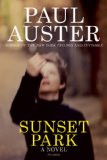Summary | Excerpt | Reading Guide | Reviews | Beyond the book | Read-Alikes | Genres & Themes | Author Bio

Critics' Opinion:
Readers' Opinion:
First Published:
Feb 2010, 128 pages
Paperback:
Dec 2010, 128 pages
 Book Reviewed by:
Book Reviewed by:
Amy Reading
Buy This Book
I opened this book with some trepidation. I have been an ardent fan of Don DeLillo since college when White Noise first showed me what literature could make of our media-saturated age. Underworld felt like an enormous gift and I never wanted its 827 pages to end. But then something happened, and DeLillo's novels got a lot shorter and a lot less satisfying. The Body Artist was puzzling and vaguely mortifying. Cosmopolis was downright awful. I couldn't bring myself to read Falling Man.
So I'm glad to report that Point Omega is a pleasure, if a fleeting one. Truth be told, at 117 pages, it feels a little long. This is an aerated novel that wants to be a condensed, stylized short story, or maybe even a play. There is no real action in the book. In fact, its one dramatic event is a heavily outlined non-event. The characters move about the rooms of a small house as if in a masque, speaking dialogue handed to them from above, and DeLillo even tells us this: "He chanted the words. He intoned liturgically." This is a novel that is good for thinking. It is a novel that is supposed to be finished in the reader's head, completed by all the connections the reader finds between the long aftershocks of Bush's war on terror and the modern-day obsession with images and information flickering across screens large and small.
Richard Elster is a brusque, enigmatic man, a professor whose essay on the meaning of the word "rendition" earns him an invitation to join a top-secret war planning committee, where his contributions consist of things like the single word "haiku." "I wanted a war in three lines," he later explains. "This was not a matter of force levels or logistics. What I wanted was a set of ideas linked to transient things. This is the soul of haiku." I don't think we're meant to understand what on earth he's talking about. Elster's pronouncements made me think of a mash-up of Jack Gladney, the professor of Hitler studies in White Noise, and Robert McNamara in Error Morris's documentary, "Fog of War." Jim Finley is a younger filmmaker who has traveled to Elster's house in the California desert to convince him to participate in a documentary of Elster explaining his involvement in the war. Finley is a man who thinks so completely in terms of film that he acts as a kind of moving camera in the book, watching and witnessing others.
Point Omega is, from first word to last, about watching: how the feeling of being watched shapes one's sense of self, what happens when everyone is watching, what happens when no one is. To highlight that, DeLillo has set up a series of walls or screens against which his characters throw their thoughts. Jim Finley describes his idea for the Elster documentary as "just a man and a wall," a camera uninterruptedly filming as Elster talks about his war experiences. Elster's essay on rendition, after noting that one of the word's original meanings was "a coat of plaster applied to a masonry surface," goes on to consider "a walled enclosure in an unnamed country and a method of questioning" only different in degree from the questioning to which Finley wants to subject Elster. And bookending their ceaseless conversations in the desert are two short chapters about an unnamed man in an urban art museum watching 24 Hour Psycho, a videowork that consists of a blank room with a large screen in the middle on which is projected Hitchcock's "Psycho," slowed down so that its duration spans a full day. Point Omega would make a perfect companion piece to DeLillo's spectacular short story (which is also the opening to Underworld), "Pafko at the Wall," about how Bobby Thompson's game-winning home run left Andy Pafko standing against the outfield wall as the Giants beat the Dodgers in the 1951 pennant race.
There is a persistent thrum of danger and terror throughout the book, not least because Elster's overriding preoccupation is with "the dream of extinction," his theory that the human race is speeding toward the omega point at which our over-evolved consciousness will collapse into itself (see sidebar). And indeed there is a tragedy at the heart of the book, but not on the scale of Elster's desire. Alongside it, though, is a smaller, easily overlooked moment of crisis. Finley finds himself alone in the desert, lost, out of water, and leaning up against a cliff wall.
"The silence was complete. I'd never felt a stillness such as this, never such enveloping nothing… Could I forget my name in this silence? I took my hand off the wall and put it to my face. I was sweating heavily and licked the moist stink off my fingers. I opened my eyes. I was still here, in the outside world. Then something made me turn my head and I had to tell myself in my astonishment what it was, a fly, buzzing near. I had to say the word to myself, fly."
The cliff wall has dehumanized Finley, but what restores him to himself is language. I take it back: Point Omega could not be a play. For all its descriptions of films and its evocations of glances, the novel must be read, not witnessed. I do wish it were longer - that is, I wish DeLillo had more omnivorously taken in the contemporary moment and fed it into the gears of his literary intelligence, because his spare rooms and stark screens are too concept-driven, too slight for the monumentality of his observations, not drenched in history like Underworld. But I will take what I can get from the master. The other thing that Point Omega does is partially restore me to my admiration of Don DeLillo.
![]() This review was originally published in The BookBrowse Review in February 2010, and has been updated for the
January 2011 edition.
Click here to go to this issue.
This review was originally published in The BookBrowse Review in February 2010, and has been updated for the
January 2011 edition.
Click here to go to this issue.

If you liked Point Omega, try these:

by Paul Auster
Published 2011
Luminous, passionate, expansive, an emotional tour de force, Sunset Park follows the hopes and fears of a cast of unforgettable characters brought together by the mysterious Miles Heller during the dark months of the 2008 economic collapse.

by Jonathan Franzen
Published 2011
Freedom comically and tragically captures the temptations and burdens of liberty: the thrills of teenage lust, the shaken compromises of middle age, the wages of suburban sprawl, the heavy weight of empire. An indelible and deeply moving portrait of our time.





The Funeral Cryer by Wenyan Lu
Debut novelist Wenyan Lu brings us this witty yet profound story about one woman's midlife reawakening in contemporary rural China.
Your guide toexceptional books
BookBrowse seeks out and recommends the best in contemporary fiction and nonfiction—books that not only engage and entertain but also deepen our understanding of ourselves and the world around us.